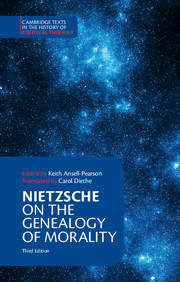54 results
2 - SUPPLEMENTARY MATERIAL TO ON THE GENEALOGY OF MORALITY
-
- Book:
- Nietzsche: <I>On the Genealogy of Morality</I> and Other Writings
- Published online:
- 28 May 2018
- Print publication:
- 16 January 2017, pp 125-126
-
- Chapter
- Export citation
Preface
- from 1 - ON THE GENEALOGY OF MORALITY
-
- Book:
- Nietzsche: <I>On the Genealogy of Morality</I> and Other Writings
- Published online:
- 28 May 2018
- Print publication:
- 16 January 2017, pp 3-124
-
- Chapter
- Export citation
Index of names
-
- Book:
- Nietzsche: <I>On the Genealogy of Morality</I> and Other Writings
- Published online:
- 28 May 2018
- Print publication:
- 16 January 2017, pp 185-188
-
- Chapter
- Export citation
Contents
-
- Book:
- Nietzsche: <I>On the Genealogy of Morality</I> and Other Writings
- Published online:
- 28 May 2018
- Print publication:
- 16 January 2017, pp v-v
-
- Chapter
- Export citation
Chronology
-
- Book:
- Nietzsche: <I>On the Genealogy of Morality</I> and Other Writings
- Published online:
- 28 May 2018
- Print publication:
- 16 January 2017, pp xxxii-xxxiv
-
- Chapter
- Export citation
Biographical synopses
-
- Book:
- Nietzsche: <I>On the Genealogy of Morality</I> and Other Writings
- Published online:
- 28 May 2018
- Print publication:
- 16 January 2017, pp xli-xliv
-
- Chapter
- Export citation
Acknowledgements and a note on the text
-
- Book:
- Nietzsche: <I>On the Genealogy of Morality</I> and Other Writings
- Published online:
- 28 May 2018
- Print publication:
- 16 January 2017, pp vi-viii
-
- Chapter
- Export citation
Cambridge Texts in the History of Political Thought
-
- Book:
- Nietzsche: <I>On the Genealogy of Morality</I> and Other Writings
- Published online:
- 28 May 2018
- Print publication:
- 16 January 2017, pp 197-200
-
- Chapter
- Export citation
4 - ‘Homer's Contest’
-
- Book:
- Nietzsche: <I>On the Genealogy of Morality</I> and Other Writings
- Published online:
- 28 May 2018
- Print publication:
- 16 January 2017, pp 177-184
-
- Chapter
- Export citation
1 - ON THE GENEALOGY OF MORALITY
-
- Book:
- Nietzsche: <I>On the Genealogy of Morality</I> and Other Writings
- Published online:
- 28 May 2018
- Print publication:
- 16 January 2017, pp 1-2
-
- Chapter
- Export citation
Human, All Too Human
- from 2 - SUPPLEMENTARY MATERIAL TO ON THE GENEALOGY OF MORALITY
-
- Book:
- Nietzsche: <I>On the Genealogy of Morality</I> and Other Writings
- Published online:
- 28 May 2018
- Print publication:
- 16 January 2017, pp 127-166
-
- Chapter
- Export citation

Nietzsche: On the Genealogy of Morality and Other Writings
-
- Published online:
- 28 May 2018
- Print publication:
- 16 January 2017
-
- Textbook
- Export citation
Introduction
-
- Book:
- Nietzsche: <I>On the Genealogy of Morality</I> and Other Writings
- Published online:
- 28 May 2018
- Print publication:
- 16 January 2017, pp ix-xxxi
-
- Chapter
- Export citation
Index of subjects
-
- Book:
- Nietzsche: <I>On the Genealogy of Morality</I> and Other Writings
- Published online:
- 28 May 2018
- Print publication:
- 16 January 2017, pp 189-196
-
- Chapter
- Export citation
Frontmatter
-
- Book:
- Nietzsche: <I>On the Genealogy of Morality</I> and Other Writings
- Published online:
- 28 May 2018
- Print publication:
- 16 January 2017, pp i-iv
-
- Chapter
- Export citation
3 - ‘The Greek State’ (1871/2)
-
- Book:
- Nietzsche: <I>On the Genealogy of Morality</I> and Other Writings
- Published online:
- 28 May 2018
- Print publication:
- 16 January 2017, pp 167-176
-
- Chapter
- Export citation
Further reading
-
- Book:
- Nietzsche: <I>On the Genealogy of Morality</I> and Other Writings
- Published online:
- 28 May 2018
- Print publication:
- 16 January 2017, pp xxxv-xl
-
- Chapter
- Export citation
Link to Untimely Meditations
-
- Book:
- A Companion to Friedrich Nietzsche
- Published by:
- Boydell & Brewer
- Published online:
- 05 February 2013
- Print publication:
- 16 July 2012, pp 81-85
-
- Chapter
- Export citation
Link to Beyond Good and Evil
-
- Book:
- A Companion to Friedrich Nietzsche
- Published by:
- Boydell & Brewer
- Published online:
- 05 February 2013
- Print publication:
- 16 July 2012, pp 227-231
-
- Chapter
- Export citation
Link to On the Genealogy of Morals
-
- Book:
- A Companion to Friedrich Nietzsche
- Published by:
- Boydell & Brewer
- Published online:
- 05 February 2013
- Print publication:
- 16 July 2012, pp 251-254
-
- Chapter
- Export citation

